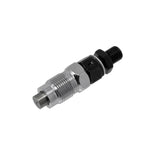-
HP injection Fuel Injector 0280155931 For Bosch 97-05 Chevrolet Gen III EV1 GM 5.7L VIN G SFuel Injector For Bosch 0280155931 Application:97-05 Chevrolet Gen III EV1 GM 5.7L VIN G & S Compatible with the brand: Bosch Part number: 0280155931 Description:Fuel Injector Condition:New, Replacement. .
- From $25.00
-
$0.00 - From $25.00
- Unit price
- per
-
Fuel Injector 0445110610 32K6100011 for Bosch Mitsubishi Engine D04EGFuel Injector 0445110610 32K6100011 for Bosch Mitsubishi Engine D04EG Application:Fit for Mitsubishi Engine: D04EG Compatible with the brand: Bosch Part number:0445110610, 0 445 110 610, 32K6100011 Description:Fuel Injector Condition:New, Original&Remanufactured PLEASE NOTE: Genuine/Original parts do not provide return or exchange service.
- From $195.00
-
$0.00 - From $195.00
- Unit price
- per
-
HP injection 0445110333 0445 110 333 Common Rail Fuel Injector for Bosch Engine 4102TCI-EU3 DFL 3.9HP injection 0445110333 0445 110 333 Common Rail Fuel Injector for Bosch Engine 4102TCI-EU3 DFL 3.9 Application:for Bosch Engine 4102TCI-EU3 DFL 3.9 Compatible with the brand: Bosch Part number:0445110333 0445 110 333 Description:Fuel Injector Condition:New, Replacement
- $123.90
-
$0.00 - $123.90
- Unit price
- per
-
HP injection 0445120028 Fuel Injector for BoschHP injection 0445120028 Fuel Injector for Bosch Application:HP injection 0445120028 Fuel Injector for Bosch Compatible with the brand: Bosch Part number:0445120028 Description: Fuel Injector Condition:New, Replacement
- $139.00
-
$0.00 - $139.00
- Unit price
- per
-
Common Rail Fuel Injector 5267035 0445120329 Fit Bosch Cummins ISDe ISBe ISDE 4.5 EngineCommon Rail Fuel Injector 5267035 0445120329 Fit Bosch Cummins ISDe ISBe ISDE 4.5 Engine Application: Bosch Cummins ISDe ISBe ISDE 4.5 Engine Compatible with the brand:Bosch Cummins Part Number: 5267035 0445120329 Condition:New, Replacement. .
- $169.90
-
$0.00 - $169.90
- Unit price
- per
-
Common Rail Fuel Injector 0445120293 For Bosch Yuichai YC6G G6A00-1112100-A38Fuel Injection 0445120293 for Bosch Original Application: Bosch Yuichai YC6G G6A00-1112100-A38 Compatible with the brand:Bosch Yuichai Part number: 0445120293 Description: Common Rail Fuel Injector Condition:New, Original
- $299.00
-
$0.00 - $299.00
- Unit price
- per
-
Fuel Injector 0432191427 0432191426 0432191512 for BoschFuel Injector 0432191427 0432191426 0432191512 for Bosch Application: For Bosch Compatible with the brand: Bosch Part number: 0432191427 0432191426 0432191512 Description:Fuel Injector Condition:New, Replacement. .
- $61.90
-
$0.00 - $61.90
- Unit price
- per
-
Fuel Injector 0445120373 610800080588 for Bosch VariousFuel Injector 0445120373 for Bosch Various Application:Weichai Power Various Compatible with the brand:Bosch Part number:0445120373,610800080588 Description:Fuel Injectior Condition:New, Replacement. .
- From $229.00
-
$0.00 - From $229.00
- Unit price
- per
-
Fuel Injector 9 430 613 809 105148-1711 62153000450A9 For BoschFuel Injector 9 430 613 809 105148-1711 62153000450A9 For Bosch Application:Fuel Injector 9 430 613 809 105148-1711 62153000450A9 For Bosch Compatible with the brand: Bosch Part number:62153000450A,9 430 613 809,9430613809,105148-1711,1051481711 Description:Fuel Injector Condition:New, Replacement
- $88.00
-
$0.00 - $88.00
- Unit price
- per
-
HP injection Common Rail Fuel Injector 0445120443 0445120451 7006351C For BoschHP injection Common Rail Fuel Injector 0445120443 0445120451 7006351C For Bosch Application:Fuel Injector 0445120443 0445120451 7006351C For Bosch Compatible with the brand:Bosch Part number:0445120443,0445120451,0 445 120 443,0 445 120 451,7006351C Description:Fuel Injector Condition:New, Replacement
- $168.00
-
$0.00 - $168.00
- Unit price
- per
-
4PCS Fuel Injector Nozzle DLLA148P2221 0433172221 612630090028 for Bosch Weichai4PCS Fuel Injector Nozzle DLLA148P2221 0433172221 612630090028 for Bosch Weichai Application:Fit For Bosch Weichai Compatible with the brand:Bosch Weichai Part number:DLLA148P2221, 0433172221, 612630090028 Description:Fuel Injector Condition:New, Replacement
- $79.90
-
$0.00 - $79.90
- Unit price
- per
-
HP injection 4 PCS Fuel Injector Nozzle 0433220190 DLL155S1057 for Bosch engine partHP injection 4 PCS Fuel Injector Nozzle 0433220190 DLL155S1057 for Bosch engine part Application:Fit for Bosch Compatible with the brand: Bosch Part number:0 433 220 190, 0433220190, DLL 155 S 1057, DLL155S1057 Description:Fuel Injector Nozzle Condition:New, Replacement
- $69.90
-
$0.00 - $69.90
- Unit price
- per
-
Fuel Injector 0445120351 5801618038 5801618038R for Bosch Iveco Engine F4DFEFuel Injector 0445120351 5801618038 5801618038R for Bosch Iveco Engine F4DFE Application:Fit for New Holland: T7.165, TC 5.80 TIER 4B Compatible with the brand: Bosch Part number:0445120351, 5801618038, 5801618038R Description:Fuel Injector Condition:New, Replacement
- $358.00
-
$0.00 - $358.00
- Unit price
- per
-
6PCS Fuel Injector Nozzle 9430084715 DLLA150P155 for Bosch Cummins Engine 6CT8.36PCS Fuel Injector Nozzle 9430084715 DLLA150P155 for Bosch Cummins Engine 6CT8.3 Application: Fit for Cummins Engine: 6CT8.3 Compatible with the brand: Bosch Cummins Part number: 9-430-084-715, 9 430 084 715, 9430084715, DLLA150P155, DLLA 150 P 155 Description:Fuel Injector Condition:New, Replacement
- $88.00
-
$0.00 - $88.00
- Unit price
- per
-
Fuel Injector 0040171221 0432231659 A0040171221 for Bosch EngineFuel Injector 0040171221 0432231659 A0040171221 for Bosch Engine Application:Fit for Bosch Engine Compatible with the brand: Bosch Part number:0432231659, 0040171221, 0 432 231 659, A0040171221 Description:Fuel Injector Condition:New, Replacement
- $65.00
-
$0.00 - $65.00
- Unit price
- per
-
HP injection Fuel Injector 0445110291 for Bosch BAW Fenix CA4DC2-10E3 1044 1065 Euro 3Fuel Injector 0445110291 for Bosch BAW Fenix CA4DC2-10E3 1044 1065 Euro 3 Application:Make Model Size Years Engine Code and Other Specifications BAW Fenix 3.2 d 2008- CA4DC2-10E3, 1044, 1065, Euro 3 FAW LD Truck 3.0 d Compatible with the brand: Bosch BAW Part number:0445110291...
- $198.00
-
$0.00 - $198.00
- Unit price
- per
-
HP injection Common Rail Fuel Injector 0445120324 for Bosch engine partHP injection Common Rail Fuel Injector 0445120324 for Bosch engine part Application:Fuel Injector 0445120324 for Bosch Compatible with the brand: Bosch Part number:0445120324,1112010-440 Description:Fuel Injector Condition:New, Replacement
- $268.00
-
$0.00 - $268.00
- Unit price
- per
-
HP injection Common Rail Fuel Injector 0445120277 CRIN2-6DM2 for Bosch engine partHP injection Common Rail Fuel Injector 0445120277 CRIN2-6DM2 for Bosch engine part Application:Xichai Engine J6 Compatible with the brand: Bosch Part number:0445120277,CRIN2-6DM2 Description:Fuel Injector Condition:New, Replacement
- $280.00
-
$0.00 - $280.00
- Unit price
- per
-
HP injection Common Rail Fuel Injector 0445120226 for Bosch Engine Yuchai YC6GHP injection Common Rail Fuel Injector 0445120226 for Bosch Engine Yuchai YC6G Application:Fuel Injector 0445120226 for Bosch Engine Yuchai YC6G Compatible with the brand: Bosch Yuchai Part number:0445120226 Description:Fuel Injector Condition:New, Replacement
- $308.00
-
$0.00 - $308.00
- Unit price
- per
-
Fuel Injector 0445120347 for Bosch Perkins VariousFuel Injector 0445120347 for Bosch Perkins Various Application:Fuel Injector 0445120347 for Bosch Perkins Various Compatible with the brand: Bosch Perkins Part number:0445120347 Description:Fuel Injector Condition:New, Replacement
- $368.00
-
$0.00 - $368.00
- Unit price
- per
Bosch Fuel Injectors
What are Bosch fuel injectors?
Bosch fuel injectors, also called Bosch common rail fuel injectors, are devices for atomizing and and injecting fuel into an internal combustion engine, which are specially used on auto engines. It was also called the racing fuel injectors and the fast fuel injectors.
What is the application of Bosch fuel injectors?
Bosch fuel injectors have widely applications on vehicles and diesel passenger cars, SUVs, van and pick up trucks:
Ashok Leyland, Audi, BharatBenz, Force Motors (Bajaj Tempo), BMW, Chevrolet, Dacia, Eicher, Fiat, Ford, Honda, Hyundai, Isuzu, Jaguar, Jeep, Land Rover Group, Man, Mercedes-Benz, Mini (BMW), M&M, Maruti, Nissan, Porsche, Renault, Skoda, Suzuki, Swaraj Mazda, Tata (Telco), Toyota, Volvo.
What are your most popular Bosch fuel injectors?
Our most popular Bosch OEM fuel injectors are 0 445 120 255, 0445120255, for Dodge Cummins 5.9 diesel engine.
What are the differences between Bosch Fuel Injectors and others?
- More fuel-efficient with lower emissions.
Fuel injectors use gasoline much more efficiently since it goes directly into the combustion chamber and atomizes in a homogeneous dispersion. The result is more complete combustion, resulting in better fuel efficiency and less pollution.
- Better for cold startups.
When the engine is not warm, the fuel doesn't vaporize as quickly. In carburetors, this is managed by adjusting the choke for a richer fuel mixture. By putting fuel directly into the combustion chamber under pressure, fuel injection overcomes this problem that dogs carbureted engines during a cold start. No longer was it necessary to crank the starter over while pumping the gas pedal to get going on a cold winter morning!
- Cooling properties.
Direct fuel injection has the benefit of putting liquid fuel into the cylinders, which immediately vaporizes and has a cooling effect on the cylinders, similar to how a squirt from a spray bottle on a hot summer day is refreshing.
- More stable but more complex.
The air/fuel ratio is more precise with fuel injection than carburation. However, the system uses a high-pressure fuel pump and fine jets, which add complex and expensive parts, even more so with modern fuel injectors that are controlled electronically via ECUs and have oxygen sensors to calibrate the air/fuel ratio.
- Choosing a selection results in a full page refresh.




























